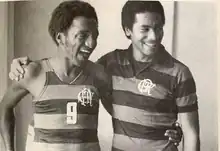 Caju in 1978 | |||||||||||||||||
| Personal information | |||||||||||||||||
|---|---|---|---|---|---|---|---|---|---|---|---|---|---|---|---|---|---|
| Full name | Paulo Cézar Lima | ||||||||||||||||
| Date of birth | 16 June 1949 | ||||||||||||||||
| Place of birth | Rio de Janeiro, Brazil | ||||||||||||||||
| Height | 1.74 m (5 ft 9 in) | ||||||||||||||||
| Position(s) | Attacking midfielder | ||||||||||||||||
| Senior career* | |||||||||||||||||
| Years | Team | Apps | (Gls) | ||||||||||||||
| 1966–1967 | Junior de Barranquilla | ||||||||||||||||
| 1967–1972 | Botafogo | 264 | (83) | ||||||||||||||
| 1972–1974 | Flamengo | 40 | (6) | ||||||||||||||
| 1974–1975 | Marseille | 31 | (16) | ||||||||||||||
| 1975–1977 | Fluminense | 39 | (11) | ||||||||||||||
| 1977–1978 | Botafogo | 28 | (4) | ||||||||||||||
| 1978–1979 | Grêmio | 5 | (1) | ||||||||||||||
| 1980 | Vasco da Gama | ||||||||||||||||
| 1981 | Corinthians | ||||||||||||||||
| 1981 | California Surf[1] | 18 | (4) | ||||||||||||||
| 1982–1983 | Aix | 21 | (3) | ||||||||||||||
| 1983 | Grêmio | ||||||||||||||||
| International career | |||||||||||||||||
| 1967–1977 | Brazil | 57 | (10) | ||||||||||||||
Medal record
| |||||||||||||||||
| *Club domestic league appearances and goals | |||||||||||||||||
Paulo Cézar Lima (born 16 June 1949), commonly known as Caju, is a Brazilian former professional footballer who played as an attacking midfielder. During his career, he played for various clubs in Brazil, most notably Botafogo, and for Marseille in France. At international level, he was capped 57 times by the Brazil national team in the 1960s and 1970s, scoring 10 goals.
Career
Caju spent his early years in Honduras, where his father Marinho Rodrigues managed Club Deportivo Olimpia during the early 1960s. In the mid-1960s Marinho took over as manager in Colombian club Junior de Barranquilla, where Caju debuted as a professional, at age 16, playing alongside Brazilian internationals Dida and Escurinho.[2]
In 1967 he moved to Botafogo de Futebol e Regatas, making his debut at age 17. He won the Campeonato Carioca (championship of the state of Rio de Janeiro) several times and many more trophies which led him to become one of Botafogo de Futebol e Regatas' all-time greatest and most honoured players.
Caju was most widely known as a member of the Brazil national team in the World Cup in 1970 and in 1974. With the Brazil national team he collected 57 caps and 10 goals.[3]
Caju featured in the Brazilian Bola de Ouro team of the season in Brazil in the seasons 1970, 1972, 1976, 1977.

In the 1990s,[4] Paulo César Lima was the subject of a documentary film by João Moreira Salles[5] The documentary depicts his flamboyance on and off the field during his days as a football player, and the difficult adjustments he had to make afterwards, outside of the limelight, and surviving on his income as a landlord.[4][6][7]
Clubs
- 1966–1967 Junior de Barranquilla -Colombia
- 1967–1972 Botafogo de Futebol e Regatas
- 1972–1974 Clube de Regatas do Flamengo
- 1974–1975 Olympique de Marseille
- 1975–1977 Fluminense Football Club
- 1977–1978 Botafogo de Futebol e Regatas
- 1978–1979 Grêmio Foot-Ball Porto Alegrense
- 1980 Club de Regatas Vasco da Gama
- 1981 Sport Club Corinthians Paulista
- 1982–1983 AS Aix
- 1983 Grêmio Foot-Ball Porto Alegrense[8]
Honours
Botafogo
Flamengo
- Campeonato Carioca: 1972 and 1974
Fluminense
- Campeonato Carioca: 1975 and 1976
- Tournoi de Paris: 1976
- Teresa Herrera Trophy: 1977
Grêmio
- Campeonato Gaúcho: 1979 and 1980
- Copa Intercontinental: 1983
Vasco da Gama
- Trofeo Colombino: 1980
Brazil
- FIFA World Cup: 1970
- Roca Cup: 1971
- Brazil Independence Cup: 1972
Personal titles
- Brazilian Bola de Prata (Placar): 1970, 1972, 1976, 1977
- Rio state league's top scorer: 1971
References and footnotes
- ↑ "North American Soccer League Players". Nasljerseys.com. 16 June 1949. Retrieved 8 June 2011.
- ↑ "O jogo da minha vida".
- ↑ "Paulo César Caju – Paulo César Lima – Sambafoot.com, all About Brazilian Football". En.sambafoot.com. Retrieved 8 June 2011.
- 1 2 "Futebol". DVD Times. 31 May 2006. Retrieved 8 June 2011.
- ↑ One of three soccer-related documentaries released in 2006 in a boxed set called Futebol.
- ↑ Football: Best view ever of the beautiful game | Independent on Sunday, The | Find Articles at BNET.com
- ↑ "Madman Sports – Futebol". Madman.com.au. Retrieved 8 June 2011.
- ↑ "weltfussball". Weltfussball.de. 16 June 1949. Archived from the original on 14 December 2007. Retrieved 8 June 2011.